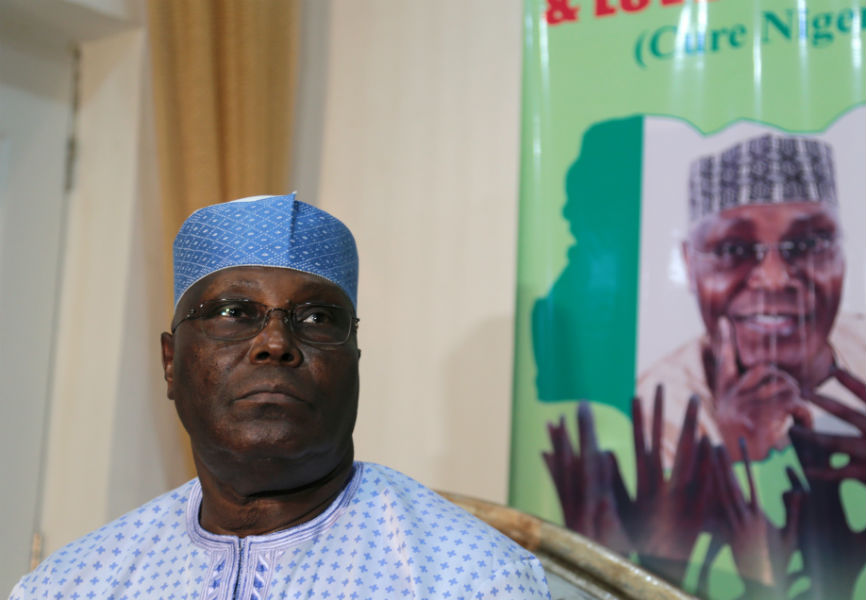The People's Democratic Party (PDP), Nigeria's main opposition party, has chosen Abubakar Atiku to face off against President Muhammadu Buhari in next February's election, setting up a race that will likely focus on a struggling economy. Eurasia Group expert
Tochi Eni-Kalu discusses the electoral dynamics in Africa's most populous country.
Who is Atiku?
A former Nigerian vice president (1999-2007), Atiku has been a prominent political figure since the restoration of multi-party democracy in 1999. After leaving the ruling All Progressives Congress for the PDP in late 2017, he has become one of Buhari's harshest critics, especially on the economy. Atiku has touted his experience in government and business as being what the country needs, citing his role overseeing economic reforms amid solid growth under former president Olusegun Obasanjo. His proposed policy program has
emphasized job creation, and he has promised to implement liberal economic policies if elected,
including scrapping the current system of multiple exchange rates that he describes as “anti-business.”
Nigeria, which recently emerged from recession, continues to grapple with weak growth. Moreover, data from the National Bureau of Statistics shows that unemployment reached 18% at the end of 2017 after 12 consecutive quarters of increases and that underemployment is widespread. Still, Atiku is considered a corrupt figure by many voters, a perception that dates from his time in Obasanjo's administration when he allegedly accumulated significant holdings in oil and banking enterprises and built a sizeable real estate portfolio. And at 71, his selection as the PDP's candidate will not satisfy segments of the electorate calling for more youthful leadership.
What are his chances of winning?
Atiku's chances of victory largely depend on four factors: his pick for vice president, ability to unite the PDP behind his candidacy, success in building campaign momentum, and ability to make inroads into Buhari's northern base.
Atiku's chances could be boosted by the selection of an exciting, youthful running mate who motivates apathetic voters to go to the polls. But he must decide between choosing someone from the swing southwest region, or one from the southeast, whose votes helped him secure the party nomination; how he navigates this choice and any potential fallout will be critical. Furthermore, he will have to unite a fractious group of ambitious politicians with conflicting interests. Doing so will be pivotal to maintaining the PDP's rising momentum, highlighted by the defections of several key figures from the ruling party to the PDP—including those of the senate president and the speaker of the house of representatives—and the party's near victory in an off-cycle gubernatorial election in the southwestern state of Osun.
Atiku's biggest challenge will be to find a way to crack Buhari's stranglehold on the north. The president's popular appeal in northern Nigeria is unmatched, despite widespread disenchantment among the elite, and in other parts of the country. Accounting for a combined 40% of registered voters, the northwest and northeast regions are key to electoral success. As a Fulani Muslim from the northeast, Atiku has a similar background to Buhari and appears well placed to appeal to this demographic. But he has a blemished reputation, making his ability to capitalize on Buhari errors and to craft a compelling campaign message more essential in an electoral race that promises to be close.
What should we expect if Atiku wins?
An Atiku presidency is by no means an ideal outcome for Nigeria. Nevertheless, it would present greater upside potential than a Buhari second term. Despite his age, he appears to be in good health and would likely be more energetic than Buhari. Atiku has pledged to undertake administrative, political, and economic overhauls. These would include reforms to undo protectionist, anti-market measures enacted under the current administration, as well as a stronger commitment to the devolution of resources and decision-making powers to state governments. Job creation, which Atiku has made a key campaign issue, would likely serve as a focal point for reform efforts. And his competent circle of advisers is likely to prove more effective at turning proposals into actionable policy. Nevertheless, an Atiku presidency could represent a return to a patronage-based style of leadership that would expand the scope for rent seeking and corruption.

